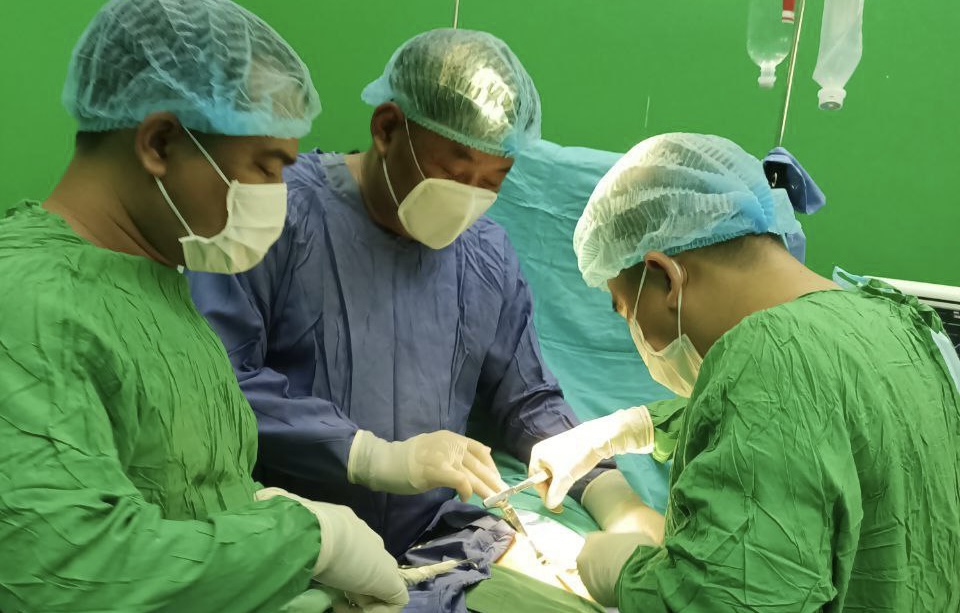
Health Science Institute’s Hospital was established in 1979 after the country was liberated from the Khmer Rouge regime under the guise of a hospital for the purpose of treating soldiers after the Read More about “Hospital”…
To prepare Nurse Student with the appropriate knowledge, skills and attitudes to provide health services in line with the identified strategies of the Health Care System of the ministry of Health.
Graduates from this program will:
In principle, applicant shall fulfill the following criteria:
Note:
Number of intakes to the ADN Program is limited based on MoH health workforce projection and capacity of production of each training institution
| Year | Theory (T) | Class Practice | Practice (P) | Field study Internship (*) | Total by Year | ||||
| Cr | Hr | Hr | Cr | Hr | Cr | Hr | Cr | Hr | |
| Ⅰ | 36 | 539 | 91 | 4 | 180 | 40 | 810 | ||
| Ⅱ | 33 | 503 | 52 | 5 | 225 | 1* | 90 | 38+1* | 870 |
| Ⅲ | 22 | 346 | 104 | 3 | 135 | 6* | 540 | 25+6* | 1125 |
| Total | 91 | 1388 | 247 | 12 | 540 | 7* | 630 | 103+7* | 2805 |
Note:
-ADN Program Total Credits=110 Credits (Included *Credits)
-ADN Program Total Hours= 2805 hours (Included *Credits)
-Theory = 1388 Hr = 49.48%
-Practice = 1417 Hr = 50.52%
| No | Adult nursing methodology Ⅰ,Ⅱ,&Ⅲ | ||||||
| 1 | Care of the client in skeletal traction and pin site care | X | 5 | ||||
| 2 | Performing oro pharyngeal suctioning | X | 5 | ||||
| 3 | Applying nasal cannula or oxygen mask | X | 10 | ||||
| 4 | Caring for clients with chest tube connected to disposal drainage system | X | 5 | ||||
| 5 | Intubating the client with a naso gastric feeding tube | X | 5 | ||||
| 6 | Inserting a indwelling catheter | X | 10 | ||||
| 7 | Performing wound suture | X | 5 | ||||
| 8 | Performing suture removal | X | 10 | ||||
| 9 | Performing Abscess incision | X | 5 | ||||
| 24 |
The Three-year ADN Course shall be assessed on a basis of continuous assessment. Students will be informed on assessment schedule, assessment process and conditions for successful completion credits of each semester at the commencement of the course. Students will not be graduated unless they pass receive Certificate of Graduation issued by Training Institution. School graduates are required to pass the National Exit Exam in order to receive their Diploma of Associate Degree in Nursing
the students to determine their strengths and weaknesses (Formative assessment)
(Summative assessment)
a – Theory Assessment
The Theory Assessment is the continuous assessment to be conducted during the course and occurred at the end of each semester:
b – Clinical Performance Assessment
The clinical performance assessment will be conducted from the 2nd semester of the first year based on clinical requirements of each semester stipulated in the curriculum:
-Barbara KOZIER & all, 2004: Fundamentals of Nursing. 7th Ed, Pearson Education Prentice Hall
-Betty. R. SWEET & Denise TIRAN 2000, Mayes’ a text book for midwifery, 12th edition, Bailliere Tindall, London
-Carol TAYLOR & al. 2001, Fundamentals of Nursing (The Art & Sciences of Nursing Care), 4th Edition Lippincott, Legal Implication of Nursing,
-CHRISTENSEN & KOCKROW. 1999. Adult Health Nursing, 3rd Edition. Mosby. St. Louis, Missouri
-Jackie CHANDLER. 1991. Tabbner’s Nursing Care: Theory and Practice, 2nd Edition Churchill Livingstone, Melbourne
-Jean Weiler ASHWILL & Susan Colvert DROSKE, 1997, Nursing Care of Children Principle and Practice, W. B. Saunders Company, Philadelphia USA
-Julie C. NOVAK & Betty L. BROOM, 1999, Maternal & Child Health Nursing (Concepts & Practice), 5th edition, Lippincott
-PERRY & POTTER. 2005. Clinical Nursing Skill and Techniques. Skills Performance Checklists, 6th Edition. Elsevier, Mosby, St. Louis, Missouri.
-PERRY & POTTER. 2006. Clinical Nursing Skill and Techniques, 6th Edition. Elsevier Mosby, St. Louis. Missouri
-Suzanne C. SMELTZER, Brenda G. BARE. 2000. Brunner & Suddarth’s Textbookof Medical-Surgical Nursing. 9th Edition. Lippincott. Philadelphia
-WHO and UNICEF 2000, Handbook Integrated Management of Childhood Illness, WHO Department of Child and Adolescent Health and Development
-Other MoH National Protocols and Guidelines

Health Science Institute’s Hospital was established in 1979 after the country was liberated from the Khmer Rouge regime under the guise of a hospital for the purpose of treating soldiers after the Read More about “Hospital”…

Leave a Comment